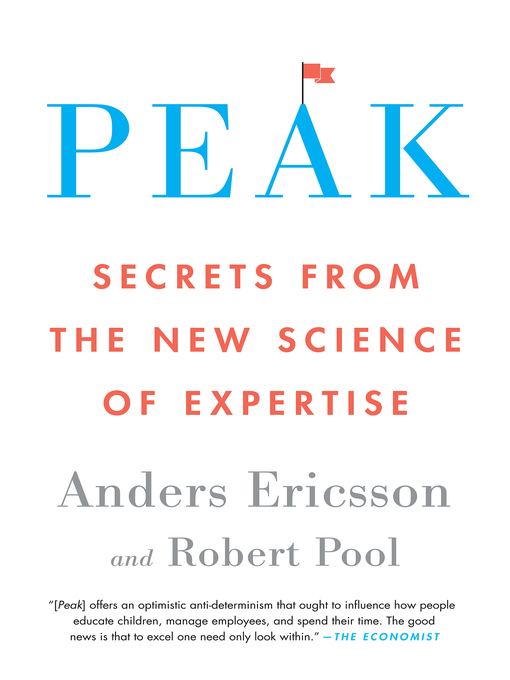
Peak
Secrets from the New Science of Expertise
کتاب های مرتبط
- اطلاعات
- نقد و بررسی
- دیدگاه کاربران
نقد و بررسی

February 22, 2016
Psychologist Ericsson (The Road to Excellence) and science writer Pool (Beyond Engineering) skillfully examine the eternal debate of nature vs. nurture with this thoughtful treatise supporting the latter. The authors posit that deliberate, focused practice is the key to learning and mastering any new skill, whether or not an underlying natural talent is present. “Generally the solution is not ‘try harder,’ but ‘try differently,’ ” they explain. Using such diverse examples as the prodigal young Mozart and a neophyte golfer hoping to make the PGA Tour, the authors explain the importance of “purposeful practice,” adaptability, and mental representations—defined as structures that organize one’s remembered information about an object or idea. For the truly motivated, a chapter entitled “The Road to Extraordinary” offers a step-by-step guide to acquiring new skills and “reach the frontier of human capabilities.” Throughout, the authors encourage dreaming big, even when conventional wisdom might dictate otherwise. This is an empowering, encouraging work that will challenge readers to reach for excellence. Agent: Elyse Cheney, Elyse Cheney Literary Associates.

February 15, 2016
Challenging the notion that talent is innate. "The most important gifts we can give our children are confidence in their ability to remake themselves again and again and the tools with which to do that job," writes Ericsson (Psychology/Florida State Univ.; editor: The Road to Excellence: The Acquisition of Expertise Performance in the Arts and Sciences, Sports and Games, 2014, etc.), assisted in this book by science writer Pool (Beyond Engineering: How Society Shapes Technology, 1999, etc.). The plasticity of the human brain, coupled with directed training and practice, is the key. Ericsson joins an increasing number of educators who focus on the importance of what he calls "deliberate practice" in achieving expertise in fields such as music and sports. This practice is best begun at an early age, so children can hone specific skills and also gain the ability to "remake themselves again and again," as circumstances change. This is a matter of practical training, not just the assimilation of abstract knowledge. It demands embarking on a realistic path to achieving a specific goal by achieving mastery of successively more difficult specific skills, and it involves a combination of mental and physical training. The idea that individual differences in ability are not genetically determined or hard-wired into the human brain has only been widely accepted in this century. Previously, talent was thought to be genetically determined so that "learning was just a way of fulfilling one's genetic potential." Ericsson gives intriguing examples of how the visual cortex in the brain of a blind person as he or she learns Braille develops connections to the fingertips and how Mozart's achievements as a child prodigy were cultivated by his father's intensive training. The author makes a strong case that success in today's world requires a focus on practical performance, not just the accumulation of information. Especially informative for parents and educators in preparing children for the challenges ahead.
COPYRIGHT(2016) Kirkus Reviews, ALL RIGHTS RESERVED.

April 15, 2016
The belief that Olympic athletes, chess Grandmasters, Nobel Prize winners, or musical prodigies are special people born with innate talent is one that Ericsson (psychology, Florida State Univ.) wants us to forget. Practice is what helps individuals become experts in their field. But not all forms of practice are equal. Here Ericsson and science writer Pool concentrate on deliberate practice, which is defined as a focused technique that follows a well-known training method, involves a teacher or a coach who provides feedback, demands near-maximal effort, and sets specific goals. Ericsson negates journalist Malcolm Gladwell's popular assertion that it takes 10,000 hours of routine exercises to gain mastery, claiming that the outcome more or less depends on many factors. Ericsson describes a variety of experiments and life stories of famous talents (e.g., composer Amadeus Mozart, hockey player Mario Lemieux, and chess player Alexander Alekhine) to prove his points and enrich his book. His demonstration is less convincing when applied to the corporate world and at work, as it focuses on acquiring and perfecting skills rather than accumulating knowledge. The description of the use of deliberate practice in education is riveting. VERDICT Recommended for readers interested in the science of expertise and/or interacting with elite performers in all fields.--Maryse Breton, Bibliotheque et Archives nationales du Quebec
Copyright 2016 Library Journal, LLC Used with permission.

























دیدگاه کاربران